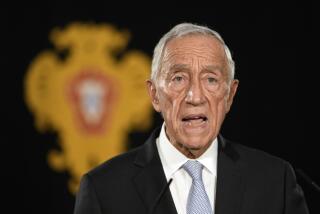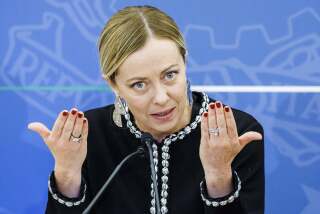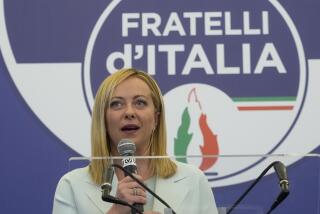Italy’s Silvio Berlusconi to resign after economic reforms passed
Reporting from Rome — Even a politician with the survival skills of Silvio Berlusconi proved, in the end, to be no match for the power of global financial markets.
The beleaguered Italian prime minister bowed to the reality of international pressure and withering domestic support Tuesday, promising to resign once Parliament passes a reform package of cuts aimed at reining in a runaway debt crisis.
The question now is whether Berlusconi’s departure would be enough to arrest the decline in Italy’s perilous financial condition, which has moved the front line of Europe’s debt crisis from peripheral countries such as Greece and Ireland to one of its central economies.
His promise to resign came after a humiliating failure to muster enough votes in a mostly symbolic budget vote, making it clear he had lost the parliamentary majority needed to govern. Even so, Berlusconi said he would not leave until lawmakers passed an unpopular economic reform bill catering to European partners who have demanded deep spending cuts in return for help in financing Italy’s $2.6-trillion debt.
It remains to be seen whether a deeply divided Parliament can pass that package of reforms, which includes selling some state enterprises and loosening labor laws. Opposition to the austerity measures remains strong, a fact Berlusconi seized on to hold out hope that he could compete, and win, should new elections be necessary.
Yet for all the scheming of Italian politics, the latest turn of events didn’t bring Italy, or the Eurozone that fears a contagion, any closer to resolving the sovereign debt crisis.
Berlusconi’s offer to step down gave an immediate lift to stock markets in the United States and was likely to be welcomed Wednesday in Europe as well. Many have come to regard the flamboyant, and sometimes reckless, politician as a major obstacle in shoring up investors’ confidence that Italy’s financial problems can be contained.
But in some ways, Berlusconi has been a sideshow. The main attraction, or worry, is that Italy, the world’s eighth-largest economy, has seen stagnant growth for more than a decade and is increasingly at risk of a financial collapse. And so far, it has taken few steps to implement changes.
Berlusconi’s opponents hailed the agreement of his promised departure, calling it a turning point. But his supporters said little had changed.
“Do you really believe that once Berlusconi leaves, everybody will suddenly become smarter and miraculously get the touch to change this country?” asked Deborah Bergamini, a Parliament member, who said she had talked with Berlusconi after he made his decision to step down. “He said to me, ‘We had to accept the fact that due to some defections, the daily operating efficiency of the Parliament was not guaranteed.’ ... Hearing him, he was calm and peaceful. I felt he was relieved.”
The same can’t be said for those tracking Italy’s finances. Italy’s public debt exceeds $2.6 trillion, or about 120% of the nation’s economy, the second-largest imbalance in Europe after Greece, where a new government is expected to be announced Wednesday afternoon amid its own financial crisis.
Italy’s debt has climbed steadily over the years as the Rome government continued to provide generous social welfare and make other expenditures — much of that lost to waste and corruption, many say — while financing it with government bonds.
When rates were low, Italy could get by. But the yield on long-term Italian bonds has been rising sharply in recent weeks, making it more costly for Italy to borrow and support its debts, thus boosting the risk that it could default or need a bailout from the Eurozone, like Greece, Portugal and Ireland.
But Italy’s economy and debts are much larger than those of other Eurozone countries. Italy has the world’s third-largest bond market after the U.S. and Japan, with banks in Germany, France and other nations facing heavy exposure.
And Eurozone leaders have been unable to raise anywhere near the amount of funds needed to rescue Italy. The worry is that Italy’s financial collapse would have repercussions for not only Northern Europe but also the U.S., sending the entire global economy into recession.
“What the markets are wondering is, ‘If you can’t deal with the Greek crisis, what on earth are you going to do if it spills to other parts of Europe,” said Fredrik Erixon, director of the European Center for International Political Economy in Brussels.
To ease investors’ fears, European leaders last week forced Berlusconi to accept monitoring of Italian finances from the International Monetary Fund. And the European Commission is expected to arrive in Rome on Wednesday to discuss details of the reform measures to bring down Italy’s debt, which also include such proposals as reductions in public spending and cuts in social welfare.
The vote on the reform package had been expected to be held next week, but Tuesday’s developments left the timing unclear. Analysts said further negotiations would take time. For example, Berlusconi’s closest coalition ally, Umberto Bossi, has strongly opposed raising the pension retirement age to 67 from 65.
Despite Berlusconi’s promise to resign, not everyone was convinced that he will quit when the time comes. In fact, Berlusconi may have even more reason to try to stay on because he could take credit for pushing through necessary national reforms, said Sergio Fabbrini, political science professor at the LUISS Guido Carli University in Rome.
“In the last 10 to 15 years, he has said and changed his mind often,” Fabbrini said. “I wouldn’t say Berlusconi is finished.”
Berlusconi has been Italy’s prime minister on three separate occasions in the last 17 years, with this latest stint beginning in 2008. He has survived dozens of no-confidence votes and many allegations of corruption and sexual improprieties.
But little by little, the media baron and conservative politician has seen his support dwindle as business leaders, the Roman Catholic Church and even his political allies have turned on him. With the European establishment and financial markets more recently tightening the pressure on Italy, many in the nation thought that it would be a matter of days or weeks before Berlusconi stepped down.
His offer to resign was announced Tuesday by President Giorgio Napolitano after their 45-minute meeting, which followed the budget vote in Parliament. The budget motion passed the lower house with 308 votes, but that was eight shy of a majority because many members abstained in a symbolic gesture of disapproval of Berlusconi’s leadership.
Santo Versace, president of the high-fashion firm Gianni Versace and a member of the lower house, left Berlusconi’s central-right party in September after months of disenchantment with the prime minister’s inability to carry out reforms and economic growth policies.
“I’m now going to Parliament and will abstain and will work together with the opposition for a new government,” Versace said in an interview. “We really need a government of reform.”
Times staff writer Tom Petruno in Los Angeles and special correspondent Livia Borghese in Rome contributed to this report.
More to Read
Sign up for Essential California
The most important California stories and recommendations in your inbox every morning.
You may occasionally receive promotional content from the Los Angeles Times.











